常见不及物动词搭配
常见不及物动词搭配

一、接不定式(而不接动名词)作宾语的24 个常用动词afford to do sth. 负担得起做某事 agree to do sth.同意做某事 arrange to do sth. 安排做某事 ask todo sth.要求做某事 beg to do sth.请求做某事 care to do sth.想要做某事 choose to do sth.决定做某事 decide to do sth.决定做某事 demand to do sth.要求做某事 determine to do sth.决心做某事 expect to do sth.期待做某事 fear to do sth.害怕做某事 help to do sth.帮助做某事 hope to do sth.希望做某事 learn to do sth.学习做某事 manage to do sth.设法做某事 offer to do sth.主动提出做某事plantodosth.计划做某事 preparetodosth.准备做某事 pretendtodosth. 假装做某事 promise to do sth.答应做某事 refuse to do sth.拒绝做某事 want to do sth.想要做某事 wish to dosth.希望做某事注:有些不及物动词后习惯上也接不定式,不接动名词:aim to do sth.打算做某事 fail to do sth.未能做某事 long to do sth.渴望做某事happen to do sth.碰巧做某事 hesitate to do sth.犹豫做某事 struggle to do sth.努力做某事跟介词搭配的不及物动词count on 依靠 embark on 上路 gamble on 以,, 打赌 insist on 坚持 ,,rely on 依靠 theorize on 对,, 推理,对 ,, 建立理论 harp on 老提到 ,,calculate on 指望,依靠concentrate on 集中到 ,,depend on 依靠 reckon on 盼望,指望 ,,account for 说明,解释 ,,answer for 回答 ,,apologize for 为,, 道歉 suffer for 为 ,, 受苦 pay for 为 ,, 付钱 look for 寻找 atone for 补偿,赔偿 make up for 补偿 stand for 代表及物动词与不及物动词 :在英语中按动词后可否直接跟宾语,可以把动词分成两种:及物动词与不及物动词。
常见不及物动词及搭配
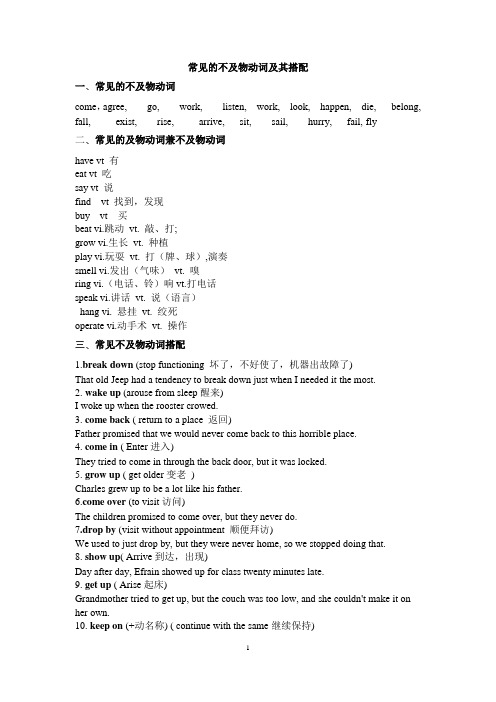
常见的不及物动词及其搭配一、常见的不及物动词come,agree, go, work, listen, work, look, happen, die, belong, fall, exist, rise, arrive, sit, sail, hurry, fail, fly二、常见的及物动词兼不及物动词have vt 有eat vt 吃say vt 说find vt 找到,发现buy vt 买beat vi.跳动vt. 敲、打;grow vi.生长vt. 种植play vi.玩耍vt. 打(牌、球),演奏smell vi.发出(气味)vt. 嗅ring vi.(电话、铃)响vt.打电话speak vi.讲话vt. 说(语言)hang vi. 悬挂vt. 绞死operate vi.动手术vt. 操作三、常见不及物动词搭配1.break down (stop functioning 坏了,不好使了,机器出故障了)That old Jeep had a tendency to break down just when I needed it the most.2. wake up (arouse from sleep醒来)I woke up when the rooster crowed.3. come back ( return to a place 返回)Father promised that we would never come back to this horrible place.4. come in ( Enter进入)They tried to come in through the back door, but it was locked.5. grow up ( get older变老)Charles grew up to be a lot like his father.e over (to visit访问)The children promised to come over, but they never do.7.drop by (visit without appointment 顺便拜访)We used to just drop by, but they were never home, so we stopped doing that.8. show up( Arrive到达,出现)Day after day, Efrain showed up for class twenty minutes late.9. get up ( Arise起床)Grandmother tried to get up, but the couch was too low, and she couldn't make it on her own.10. keep on (+动名称) ( continue with the same继续保持)He tried to keep on singing long after his voice was ruined.11. come to ( regain consciousness恢复意识)He was hit on the head very hard, but after several minutes, he started to come to again.12.go on ( Continue继续)He would finish one Dickens novel and then just go on to the next.13. go on (2) ( Happen发生)The cops heard all the noise and stopped to see what was going on.14. keep away from ( remain at a distance保持距离)The judge warned the stalker to keep away from his victim's home.四、跟介词搭配的不及物动词count on 依靠insist on坚持……rely on依靠calculate on 指望,依靠concentrate on 集中到……depend on依靠account for 说明,解释……apologize for为……道歉suffer for为……受苦pay for 为……付钱look for 寻找make up for补偿stand for代表compensate for 补偿refrain from抑制,忍住suffer from 受苦,患病benefit from 获益于escape from 从……逃开approve of 同意consist of 由……组成deal/cope with 处理reckon on盼望,指望……despair of 失望dream of 梦想做某事believe in 相信……persevere in 坚持……succeed in 在某方面成功delight in 为……高兴join in 加入……participate in 参加……persist in 坚持……specialize in 专门从事某事,在某方面专长aim at 瞄准于……laugh at 嘲笑smile at向……微笑work at 从事于……,用功于……look at 看着……object to 反对……react to 对某事作出反应respond to 对某事作出回应refer to 提到……turn to 转向……。
不及物的用法
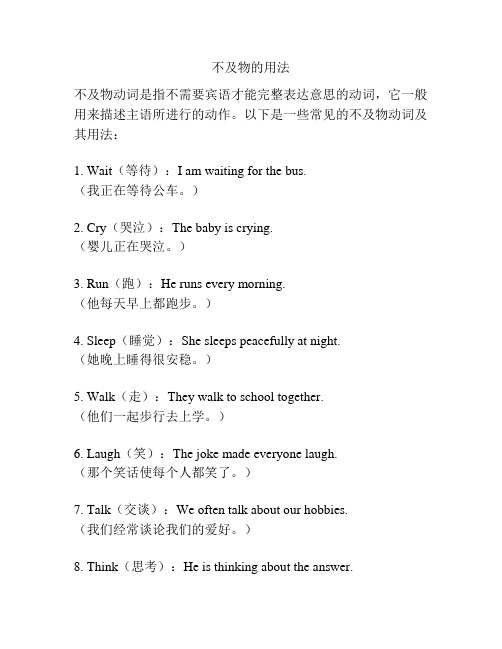
不及物的用法
不及物动词是指不需要宾语才能完整表达意思的动词,它一般用来描述主语所进行的动作。
以下是一些常见的不及物动词及其用法:
1. Wait(等待):I am waiting for the bus.
(我正在等待公车。
)
2. Cry(哭泣):The baby is crying.
(婴儿正在哭泣。
)
3. Run(跑):He runs every morning.
(他每天早上都跑步。
)
4. Sleep(睡觉):She sleeps peacefully at night.
(她晚上睡得很安稳。
)
5. Walk(走):They walk to school together.
(他们一起步行去上学。
)
6. Laugh(笑):The joke made everyone laugh.
(那个笑话使每个人都笑了。
)
7. Talk(交谈):We often talk about our hobbies.
(我们经常谈论我们的爱好。
)
8. Think(思考):He is thinking about the answer.
(他正在考虑答案。
)
9. Sing(唱歌):She sings beautifully.
(她唱得很美。
)
10. Dance(跳舞):They dance gracefully on the stage. (他们在舞台上跳舞优美。
)。
10个不及物动词例子大全
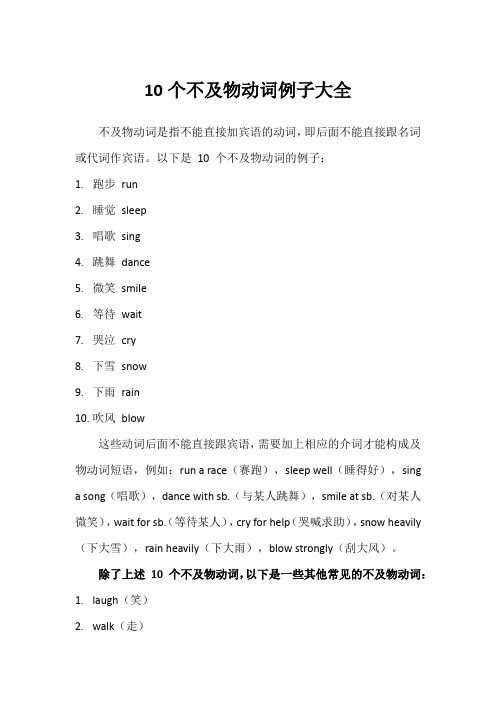
10个不及物动词例子大全
不及物动词是指不能直接加宾语的动词,即后面不能直接跟名词或代词作宾语。
以下是10 个不及物动词的例子:
1.跑步run
2.睡觉sleep
3.唱歌sing
4.跳舞dance
5.微笑smile
6.等待wait
7.哭泣cry
8.下雪snow
9.下雨rain
10.吹风blow
这些动词后面不能直接跟宾语,需要加上相应的介词才能构成及物动词短语,例如:run a race(赛跑),sleep well(睡得好),sing a song(唱歌),dance with sb.(与某人跳舞),smile at sb.(对某人微笑),wait for sb.(等待某人),cry for help(哭喊求助),snow heavily (下大雪),rain heavily(下大雨),blow strongly(刮大风)。
除了上述10 个不及物动词,以下是一些其他常见的不及物动词:
ugh(笑)
2.walk(走)
3.swim(游泳)
4.talk(说话)
5.think(思考)
6.hope(希望)
7.dream(梦想)
8.work(工作)
9.study(学习)
10.live(生活)
这些动词都不能直接跟宾语,需要加上适当的介词或副词才能构成及物动词短语。
例如,talk to/with sb.(与某人交谈),think about sth.(思考某事),hope for sth.(希望某事),dream of sth.(梦想某事),work on sth.(从事某事),study for sth.(为某事学习),live in sp.(住在某地)。
常见的不及物动词短语
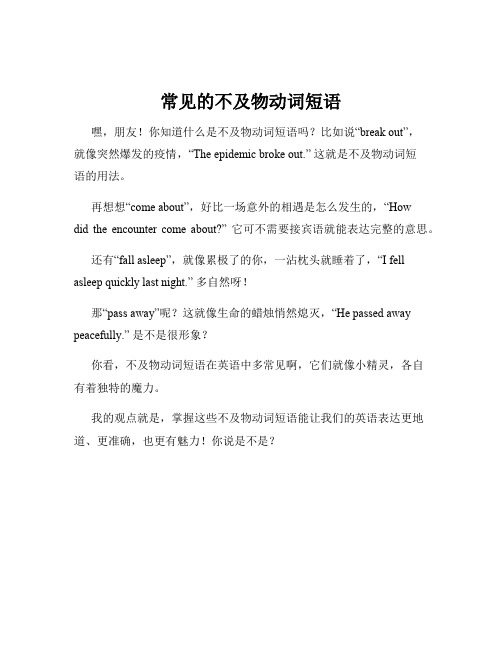
常见的不及物动词短语
嘿,朋友!你知道什么是不及物动词短语吗?比如说“break out”,
就像突然爆发的疫情,“The epidemic broke out.” 这就是不及物动词短
语的用法。
再想想“come about”,好比一场意外的相遇是怎么发生的,“How
did the encounter come about?” 它可不需要接宾语就能表达完整的意思。
还有“fall asleep”,就像累极了的你,一沾枕头就睡着了,“I fell asleep quickly last night.” 多自然呀!
那“pass away”呢?这就像生命的蜡烛悄然熄灭,“He passed away peacefully.” 是不是很形象?
你看,不及物动词短语在英语中多常见啊,它们就像小精灵,各自
有着独特的魔力。
我的观点就是,掌握这些不及物动词短语能让我们的英语表达更地道、更准确,也更有魅力!你说是不是?。
sit的用法和固定搭配

sit的用法和固定搭配用法:"sit"是一个常用的动词,表示坐下或使某人坐下。
它可以用于不同的语境中。
一. sit作为不及物动词1. Sit down这是sit最常见的用法之一,意思是“坐下”。
当你想告诉别人坐下时,可以说:"Please sit down." 这个短语通常用于正式场合或者你想要表达礼貌。
2. Sit still"Still"意为静止不动,所以"sit still"表示“保持静止”,用来告诉孩子们在某个地方保持安静。
例如,教师可能会说:"Please sit still and don't make any noise in the classroom."3. Sit tight"sit tight" 是一个习惯性用法,意为“耐心等待”。
在尚未开始或者期望某事发生时使用。
例如, 你可能会告诉朋友:"Sit tight, I'll be back soon!" 这样对方就知道需要等待片刻。
4. Sit around"sit around"通常指无所事事地坐着。
有时候我们可能在家里无聊,并且没有其他特定的行动计划。
所以我们可能会说:“I have nothing to do today, so I'll just sit around and relax.”二. sit作为及物动词1. Sit someone down这个短语是指让某人坐下。
当你想要一个人停下来并安静地坐下时,你可以说:“Sit him down and talk to him calmly.” 这是用于管理冲突或聊天的一种方法。
2. Sit somebody up"Sit somebody up"意思是让某人从平躺的状态转变为坐直的状态。
persist的用法和搭配
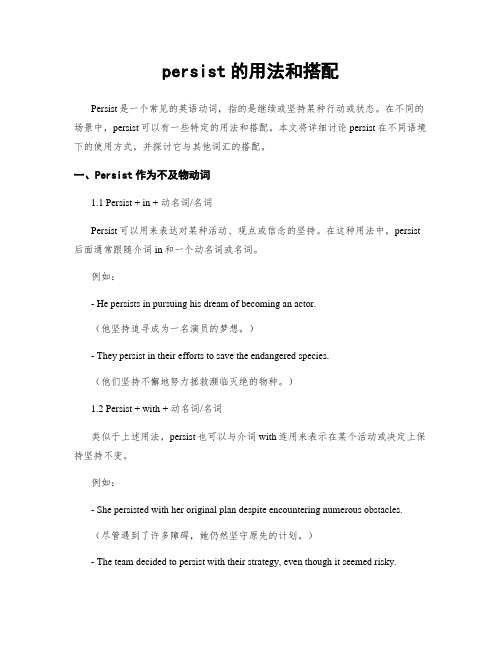
persist的用法和搭配Persist是一个常见的英语动词,指的是继续或坚持某种行动或状态。
在不同的场景中,persist可以有一些特定的用法和搭配。
本文将详细讨论persist在不同语境下的使用方式,并探讨它与其他词汇的搭配。
一、Persist作为不及物动词1.1 Persist + in + 动名词/名词Persist可以用来表达对某种活动、观点或信念的坚持。
在这种用法中,persist 后面通常跟随介词in和一个动名词或名词。
例如:- He persists in pursuing his dream of becoming an actor.(他坚持追寻成为一名演员的梦想。
)- They persist in their efforts to save the endangered species.(他们坚持不懈地努力拯救濒临灭绝的物种。
)1.2 Persist + with + 动名词/名词类似于上述用法,persist也可以与介词with连用来表示在某个活动或决定上保持坚持不变。
例如:- She persisted with her original plan despite encountering numerous obstacles.(尽管遇到了许多障碍,她仍然坚守原先的计划。
)- The team decided to persist with their strategy, even though it seemed risky.(尽管这个策略看起来有风险,但团队决定坚持下去。
)1.3 Persist + in + doing sth.Persist也可以和动词的ing形式连用,表示持续进行某项活动。
例如:- She persisted in studying late into the night for the upcoming exam.(她坚持深夜学习准备即将到来的考试。
不及物动词+介词+宾语
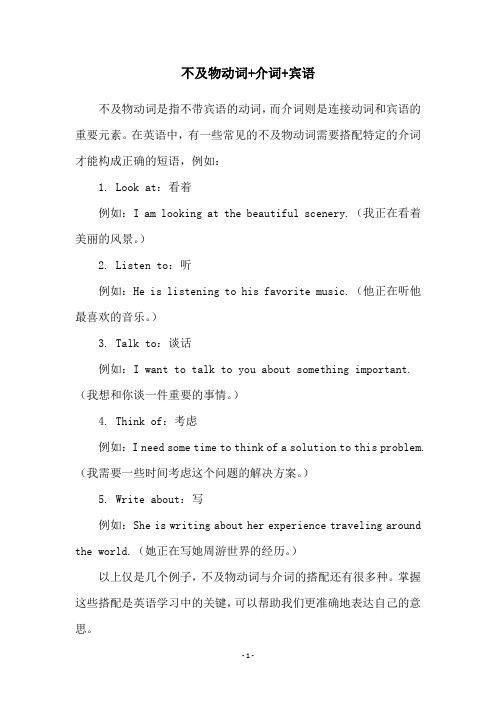
不及物动词+介词+宾语
不及物动词是指不带宾语的动词,而介词则是连接动词和宾语的重要元素。
在英语中,有一些常见的不及物动词需要搭配特定的介词才能构成正确的短语,例如:
1. Look at:看着
例如:I am looking at the beautiful scenery.(我正在看着美丽的风景。
)
2. Listen to:听
例如:He is listening to his favorite music.(他正在听他最喜欢的音乐。
)
3. Talk to:谈话
例如:I want to talk to you about something important.(我想和你谈一件重要的事情。
)
4. Think of:考虑
例如:I need some time to think of a solution to this problem.(我需要一些时间考虑这个问题的解决方案。
)
5. Write about:写
例如:She is writing about her experience traveling around the world.(她正在写她周游世界的经历。
)
以上仅是几个例子,不及物动词与介词的搭配还有很多种。
掌握这些搭配是英语学习中的关键,可以帮助我们更准确地表达自己的意思。
- 1、下载文档前请自行甄别文档内容的完整性,平台不提供额外的编辑、内容补充、找答案等附加服务。
- 2、"仅部分预览"的文档,不可在线预览部分如存在完整性等问题,可反馈申请退款(可完整预览的文档不适用该条件!)。
- 3、如文档侵犯您的权益,请联系客服反馈,我们会尽快为您处理(人工客服工作时间:9:00-18:30)。
常见不及物动词搭配 Document number:NOCG-YUNOO-BUYTT-UU986-1986UT一、接不定式(而不接动名词)作宾语的24个常用动词afford to do sth. 负担得起做某事 agree to do sth. 同意做某事 arrange to do sth.安排做某事 ask to do sth. 要求做某事 beg to do sth. 请求做某事 care to do sth. 想要做某事 choose to do sth. 决定做某事 decide to do sth. 决定做某事 demand to do sth. 要求做某事 determine to do sth. 决心做某事 expect to do sth. 期待做某事 fear to do sth. 害怕做某事 help to do sth. 帮助做某事 hope to do sth. 希望做某事 learn to do sth. 学习做某事 manage to do sth. 设法做某事 offer to do sth. 主动提出做某事 plan to do sth. 计划做某事prepare to do sth. 准备做某事 pretend to do sth. 假装做某事 promise to do sth. 答应做某事 refuse to do sth. 拒绝做某事 want to do sth. 想要做某事 wish to do sth. 希望做某事注:有些不及物动词后习惯上也接不定式,不接动名词:aim to do sth. 打算做某事 fail to do sth. 未能做某事 long to do sth. 渴望做某事 happen to do sth. 碰巧做某事 hesitate to do sth. 犹豫做某事 struggle to do sth. 努力做某事跟介词搭配的不及物动词count on 依靠 embark on上路 gamble on以……打赌 insist on坚持…… rely on依靠theorize on 对……推理,对……建立理论 harp on 老提到…… calculate on 指望,依靠 concentrate on 集中到…… depend on依靠 reckon on盼望,指望…… account for 说明,解释…… answer for回答…… apologize for 为……道歉 suffer for为……受苦 pay for 为……付钱 look for 寻找 atone for补偿,赔偿 make up for补偿stand for代表compensate for 补偿 abstain from 有意回避,弃权 desist from 停止 refrain from抑制,忍住 shrink from 回避 suffer from 受苦,患病 benefit from 获益于 flinch from 退缩 escape from 从……逃开 approve of 同意boast of 吹牛 consist of 由……组成 despair of 失望 dream of 梦想做某事 repent of 忏悔,懊悔 believe in 相信…… persevere in 坚持…… revel in 陶醉,着迷于…… succeed in 在某方面成功 delight in 为……高兴 join in 加入…… participate in 参加…… persist in 坚持…… specialize in 专门从事某事,在某方面专长 aim at 瞄准于……chafe at 恼怒,不满 frown at 向……皱眉头 scowl at 沉下脸……,对……皱眉 laugh at 嘲笑 smile at 向……微笑 work at 从事于……,用功于…… look at 看着…… attend to 参加…… certify to 证明…… allude to 暗示…… confess to 承认…… descend to 下降到…… object to 反对…… react to 对某事作出反应 refer to 提到……resort to 求助,采用…… see to 检查…… submit to 提交…… testify to 表明,说明…… turn to 转向…… fall to 下跌,减弱及物动词与不及物动词:在英语中按动词后可否直接跟宾语,可以把动词分成两种:及物动词与不及物动词。
及物动词 vt.及物动词:又称“他动词”。
又称“外动词”。
动词的一种。
它所表示的动作常涉及动作者以外的事物,如“吃”、“穿”、“读”、“写”等。
字典里词后标有vt. 的就是及物动词。
及物动词后必须跟有动作的对象(即宾语),并且可直接跟宾语。
如see 看见 (vt.) +宾语 I can see a boy.其实所谓“及物”,就是后面可直接加宾语的动词,有被动形式,而不及物动词是没有被动式的,也不可直接加宾语,需加上介词。
及物动词后面可直接接宾语,不及物动词后面不可直接接宾语,一般要加介词后再接宾语。
实际上很多动词既是及物动词,又是不及物动词。
举一个例子,就说write。
如I am writing.和I am writing a letter.在前一个句子write是不及物动词,在后一个句子write是及物动词。
又如,see是及物动词,但在特殊情况下如seeing is believing。
示例不及物动词就是一个动作不能施加到另一个物体上,也就是后面不能加宾语。
例如:He is running. run这个动词就是不及物动词,后面不能加sth。
(不能说跑什么东西)分清及物不及物动词:分清动词的及物不及物是在英语学习中必须解决的首要问题。
动词及物与不及物通常有以下几种情况:a.主要用作及物动词。
及物动词后面必须跟宾语。
可以用于:"主+谓+宾";"主+谓+双宾";"主+谓+宾+宾补"结构。
如:He reached Paris the day before yesterday.Please hand me the book over there.They asked me to go fishing with them.类似的还有:buy, catch, invent, found, like, observe, offer, prevent, promise, raise, find, forget, receive, regard, see, say, seat, supply, select, suppose, show, make, take, tell....b.主要用作不及物的动词。
不及物动词后面不跟宾语。
只能用于:"主+谓"结构。
This is the room where I once lived.类似的还有:agree, go, work, listen, look, come, die, belong, fall, exist, rise, arrive, sit, sail, hurry, fail, succeed....c.既可以用作及物又可以用作不及物的动词,其意义不变。
如begin 都是作"开始"讲。
everybody , our game begins. let us begin our game. 类似的还有:start, answer, sing, close, consider, insist, read, learn, prepare, pay, hurt, improve....d.既可以用作及物又可以用作不及物的动词,其意义完全不同。
这类动词作不及物动词是一个意义;而作及物动词时却是另一个意义。
如lift作不及物动词时是指烟雾的"消散"。
we saw the mountain when the clouds lifted. 作及物动词时是"升高;举起"。
He lifted his glass and drank.类似的还有:beat vi.跳动 vt. 敲、打;grow vi.生长 vt.种植play vi.玩耍 vt. 打(牌、球),演奏 smell vi.发出(气味) vt. 嗅ring vi.(电话、铃)响vt.打电话speak vi.讲话vt. 说(语言)hang vi. 悬挂 vt.绞死operate vi.动手术vt. 操作在英语错误中,“及物动词+介词+宾语”(transitive verb+preposition+object),是常见的一种。
所谓及物动词,就是谓语动词(predicative verb),不必通过介词引荐宾语。
相反的,不及物动词(intransitive verb)是不带宾语的。
有许多动词,虽然性质是及物的,但不一定要有宾语,如下列的①a和②a便是这种情形:①a. We study every day.①a. We study every day.b. Do you study English every day.②a. Please write clearly next time.b. Can you write your composition now如果本质上就是不及物动词,就不会有宾语;若要宾语,就要借介词之助,一起连用才行(不及物动词+宾语+介词),如③b和④b;③a和④a是错的;*③a. The children are listening the music.b. The children are listening to the music.*④a. She is laughing the crippled man.b. She is laughing at the crippled man.反之,及物动词不必靠介词,就可以带宾语,如上述的①b和②b ,又如⑤和⑥:⑤ John is giving a book to me.⑥ Who will answer this question如果无意中把介词加上,就错了,如:*⑦ Who will answer to this question下列这句从房地产广告中看到的句子,也犯了同样的错:“We have many buyers awaiting for available units here.”“Awaiting”是个及物动词,后面的介词“for”是多余的,要去掉;不然把“awaiting”改为“waiting for”也行。
